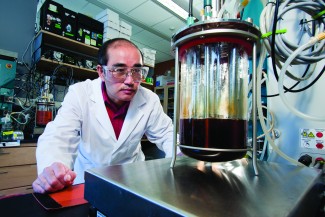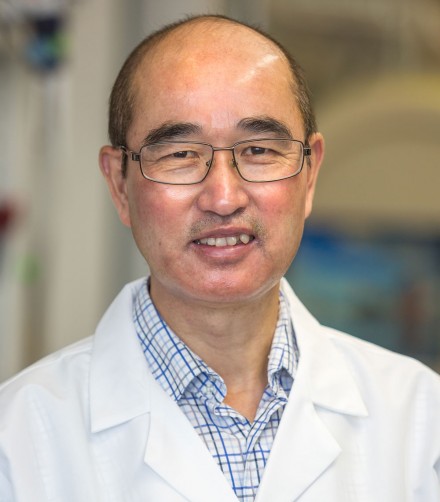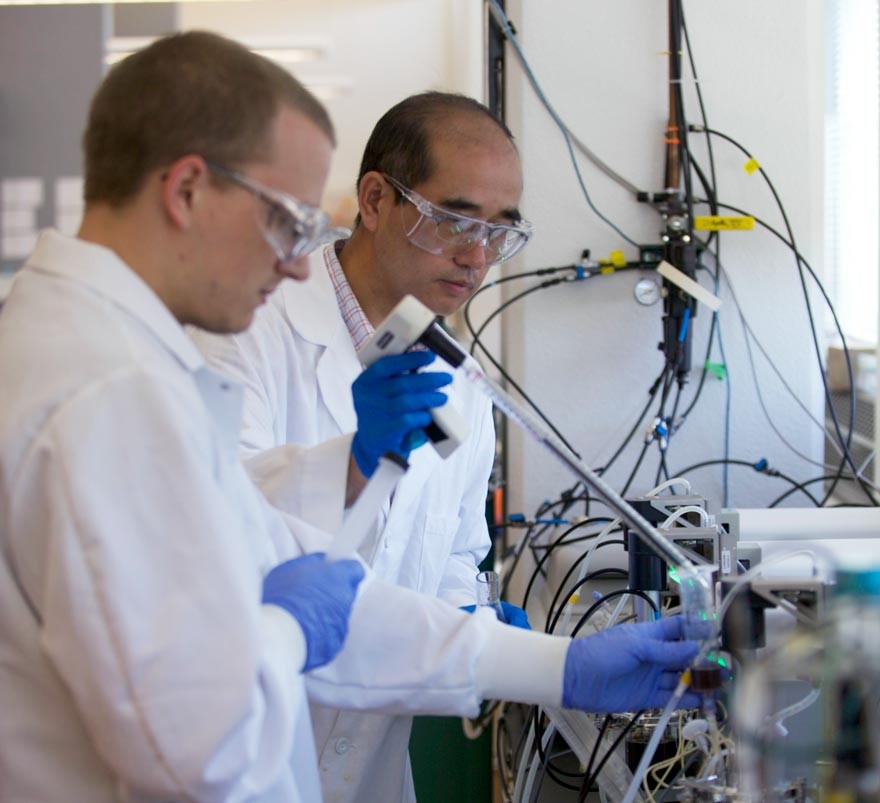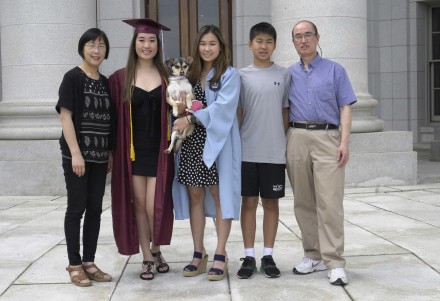Wisconsin Energy Institute mourns the loss of senior scientist Yaoping Zhang

Yaoping Zhang wasn’t afraid of hard work and didn’t seek the spotlight.
A senior scientist with the Great Lakes Bioenergy Research Center and Wisconsin Energy Institute, Zhang contributed to dozens of frequently-cited papers, though colleagues remember him mostly as a joyful collaborator who sought to support those around him.
Zhang died March 20 of complications from kidney cancer. He was 61.
“He was an irreplaceable part of our center,” said Bob Landick, professor of biochemistry and GLBRC science director. “I will always remember his enthusiasm and can-do attitude.”
To honor his legacy, the center has established the Yaoping Zhang Research Award, which will be given annually to recognize efforts to advance the science of sustainable plant-based fuels and products.

Lab manager Amanda Hulfachor said Zhang was like Bilbo Baggins, the protagonist of The Hobbit: “not afraid of a challenge in unchartered territories, enjoyed spending time problem solving and thinking, and seemed to greatly enjoy passing along the legacy of learning and love for life to those that were willing to learn from him."
Born in the Jiangsu province of China, Zhang earned a PhD in microbiology from the Beijing Agriculture University in 1989, when he boarded a plane for Wisconsin, where the late UW–Madison biochemist Robert Burris had offered him a job in his lab.
“All he had was $50 in his pocket and a plane ticket paid by Dr. Burris,” said his wife, Lin Rao. “All he was thinking at the time was he would succeed with his hard work in America, the land of opportunity.”
Under Burris and later with bacteriology professor Gary Roberts, Zhang studied nitrogen fixation in photosynthetic bacterium and became an expert on setting up oxygen-free lab environments.
Roberts recalls Zhang as a meticulous and diligent researcher with “a curious ability to make things work at the bench.”
“He was willing to tackle time-consuming strain constructions that seemed like the right thing to do though without an obvious payout at the end,” Roberts said. “Happily most of these did work out, which helped him move the field forward.”

In 2011, Zhang took over GLBRC’s Experimental Fermentation Lab, embracing new challenges outside of his field, such as deconstructing plant material in order to figure out what was in it and reconstructing synthetic versions for experimental controls.
It was work that most academic labs didn’t want to do, said GLBRC scientist Trey Sato.
“He was mostly interested in trying to enable others’ research, to help them be successful,” Sato said. “He didn’t care about the authorship component or the acknowledgements.
Zhang did care deeply about his family and was responsible for getting the couple’s three kids to the library, music lessons, basketball games, golf matches, and other activities.
Sato recalls how Zhang’s cell phone would often interrupt important meetings (sometimes playing “Let it Go” from the movie Frozen) with calls from his kids.
“He probably had it very loud … because he didn’t want to miss a call,” Sato said.

Zhang’s oldest daughter, Helen, said her father was a hero, mentor, and role model who sparked her love of science – she also studied microbiology – and taught her skills like sewing and finding joy in the everyday.
“He would always be the first person I would call when I needed help,” Helen said. “He had a solution for everything."
Zhang also had an infectious enthusiasm for just about everything, said GLBRC research coordinator Donna Bates. “You felt excited when you were around him."
Even after he began treatment for kidney cancer in 2019, colleagues said they never heard Zhang complain.
Bates remembers watching the solar eclipse in 2017 from the fifth floor deck of the Wisconsin Energy Institute building. Zhang was making sure everyone had safety glasses and understood the significance of the event, which wouldn’t happen again in North America for another seven years.
Zhang died less than three weeks short of the next eclipse.
“Yaoping was just so excited,” she said. “I’m sad he didn’t make it to see this one, because he really would have loved it.”
